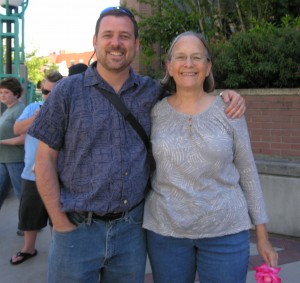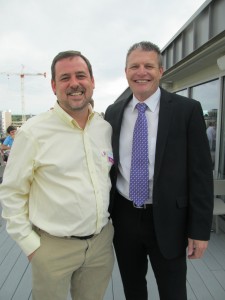When I began working at Pride Foundation nearly five years ago, I did not fully foresee what an influential and lasting difference it would make to have a staff person on the ground in Idaho working full-time on LGBTQ-related issues. Our work—and I include my colleagues in Alaska, Montana, Oregon, and Washington—is about so much more than awarding grants and scholarships each year. It’s about being a visible advocate for the LGBTQ community, building bridges, and establishing trust.
Boise is one of 11 cities in the state that has adopted an ordinance in recent years protecting LGBTQ people from discrimination in housing, employment, and public accommodations. The City Council is very progressive and outspoken when it comes to human rights issues, and flew a rainbow flag above City Hall for the first time during Boise Pride Week in 2013.
In January, Boise City Council President Maryanne Jordan, now also an Idaho senator, reached out to see if Pride Foundation would join a community panel in interviewing finalist candidates for the new Boise police chief. Other panelists included representatives of the faith and refugee communities, neighborhood association leaders, homeless advocates, the Downtown Boise Association, and Ada County Sherriff’s Office. Jordan reached out to Pride Foundation specifically because she wanted a representative from the Boise LGBTQ community.
When I asked her why it was important to the City of Boise to have an LGBTQ perspective during the interviews, she explained that Boise has a deep commitment to community policing.
“This means being proactive and collaborative in decisions such as the hiring of a police chief,” Jordan said. “The LGBTQ community has been a valuable resource to the city in crafting our non-discrimination ordinance and working proactively with the police department. Steve was invited because of his deep roots in the community, and his work with both adults and youth. Pride Foundation, and here in Boise Steve in particular, has always included the city in their work and communication. These two-way relationships add so much to good police relations.”

For me, being invited to be a part of those interviews also signaled another level of trust in and respect for Pride Foundation, and an elevated awareness by the city of the ways we’re partnering with local organizations and leaders to advance our education and advocacy efforts.
Over a two-hour timeframe, I asked the candidates questions that included how the police department could further outreach and inclusiveness in the Boise LGBTQ community, and the role the department could play in reducing disparities in the criminal justice system.
The city hired Bill Bones, who had previously worked as Boise Police Department’s deputy chief. After the interviews and before Chief Bones was officially hired, he reached out and asked me if I would be interested in speaking at an upcoming academy graduation class of new Boise police officers, which took place in February at the city’s Anne Frank Memorial, and again for another graduating class earlier this month.
The February graduation happened just after the first-ever public hearing by the Idaho Legislature on an Add the Words bill, which would have included sexual orientation and gender identity among the classes protected from discrimination in the Idaho Human Rights Act. The bill unfortunately died in committee and much of my speech reflected my thoughts following the hearing, including the fears the LGBTQ community has about feeling fully protected and safe—particularly transgender people—and the tragedy of LGBTQ teen suicides and youth homelessness due to intolerance and a lack of education and understanding.
“In meeting Steve, I found a community member dedicated to the betterment of our entire city and ensuring all citizens are provided the opportunity and ability to reach their full potential,” Bones said. “Steve recognizes the challenges, but also the enormous potential which exists in those who have not been granted equal opportunity. In speaking to the police department’s newest officers, I hoped for and received a heartfelt and engaging speech.”
“Steve was able to convey the unique challenges facing members of our LGBTQ community as an opportunity to inspire officers to make every contact with every citizen a chance to make our police department and our entire community a better, stronger place,” he said.
Since his hire, Bones has appointed one of his officers, Dan Lister, to be the department’s first officer liaison to the Boise LGBTQ community, joining Katie Davey, a Victim Witness advocate for the department who has also worked as a Boise LGBTQ community liaison for the last few years. I’ll be meeting with Bones and Lister later in the month to help them with further outreach and contacts.
This entire process has been an opportunity to reflect on the incredible and meaningful partnerships that Pride Foundation has forged with community leaders and organizations working to advance LGBTQ equality in Idaho and across the Northwest. It is because of you—our supporters, grantees, and local partners—that we were able to be engaged in this important process, elevating the voices and needs of our local community.
My thoughts are perhaps best summed up by this statement from Bill Bones: “Pride Foundation is about people,” he said. “It grants hope and opportunity, not just to our LGBTQ community, but to all of us to create a world where everyone is recognized for the values of their character. Pride Foundation provides support to individuals in need, and helps move the social struggle for equality forward for all.”
Steve Martin is Pride Foundation’s Regional Development Organizer in Idaho. Email Steve.
